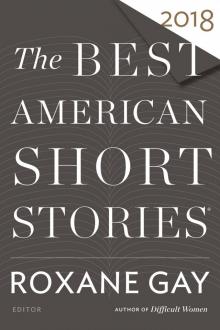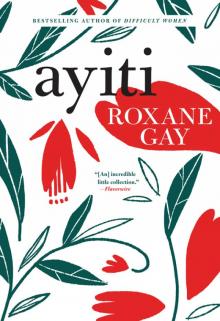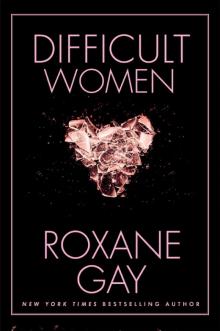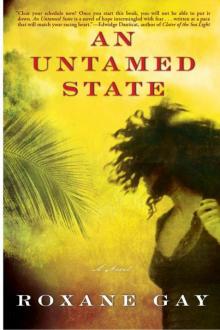- Home
- Roxane Gay
The Best American Short Stories 2018 Page 29
The Best American Short Stories 2018 Read online
Page 29
“You know I am.”
He watches you unlace your boots. “I almost called the police.”
You glance up at him. How to explain you can’t be officially unaccounted for the same night poachers are spotted on the Refuge?
“Well? Did you?”
“Kenny said you were out with that Wade fella from the mortuary. You could have called to check on me.” He gives you a dubious once-over. “You look like you slept in a ditch.”
In late April you find a cast antler out by Willow Fort. Just lying there, sharp as a scythe, half-buried by last night’s snowfall. Fresh brown. Wade glasses it from across the field and starts running. By the time you get there, Wade is standing it up. It’s taller than you, so big your hand can’t fit around its knotty stem. The burr is pink with blood.
Ice encrusts Wade’s nostrils, and in the morning sun his laughter courses out in shining eddies.
“It’ll be a grand a pound if we can find the matching one.”
“To hell with the matching one,” you say. “If there’s a live elk around, I want to see him.”
Wade indulges your frantic search for the bull’s tracks. The few hoofprints evident disappear into a bluestem grove. He isn’t surprised.
“You’re chasing ghosts,” he says.
All the way back to the road, you let him rhapsodize about the living elk of his childhood. The disheveled bulls, with their flat, dark eyes, mean-mugging like he owed them money. Riled as hell in winter as they shed and looked utterly robbed. Often a single antler would linger, listing the head, the empty pedicle raw and leprous. The cows, with their accusatory stares, distinguishable from one another only by the tick trails in their coats.
That night, emboldened by tequila, the two of you try the door of Zeke’s Antiques. Cones of light fall through the hangar windows. You trail your fingers delicately along racks of empty dresses. Wade won’t quit with conjectures about where Zeke’s old partner might be rotting. The steamer trunk is the obvious choice—but there’s room enough for a body in the old roll-top desk, too.
“Jesus,” you say as he swipes a feather boa along the nape of your neck. “Stop that.”
A chance intimacy arises when a mannequin tips over while you’re unspooling its collar of pearls. Of your clumsiness, Wade says only, “Oops”—but softly, as though your mishap is predictably endearing. As though he’s grown accustomed to telling you to watch yourself. His hand lingers on the small of your back as you right the dummy. Flushed with booze and the thrill of the break-in, you will him to lean in and close the final distance between you. Maybe get to it right there on the old card table where Crazy Jim Collins allegedly played his last hand of poker, amid the mining lanterns and a century’s worth of license plates from the forty-five states neither of you will ever see.
Instead, he sinks a plug hat onto your head. You force a laugh while he pries open the roll-top. Its dark insides smell like the woods after a rain.
In the morning you offer Kenny a ride to work. He bids his latest paramour for her address, and you find yourself winding up a familiar aspen-lined drive on Painter’s Knoll, past bison topiaries and frosted ponds. You slink around the house before finding Kenny hunched over a breakfast counter, pectorals roiling in an undershirt you’d mock were it not for the similarly clad waif charring pancakes within earshot. She calls you “honey” without raising her eyes and spoons three more puddles of batter onto the griddle.
Kenny slides his coffee over to you. “How’s your sad little heart?”
“Beat up.”
He squeezes the waif’s hips as he gets another mug, taking an age to select one. His movements are oddly, infuriatingly labored whenever he’s choosing his next words with caution.
“Why isn’t it enough just to be in love with him, Syl? I mean—what’ll happen if the feeling turns out to be mutual? You gonna give up on college, move back here for good? Wait around till the place goes bust?”
This enrages you. It’s meant to. “Maybe.”
Kenny shakes his head. “I doubt you’ve even thought that far.”
At dawn you climb into Wade’s truck fully intending to lay it all out in the open. His unwitting grin convinces you to leave it until after the hunt—no point in ruining the day. Your plan, however, doesn’t anticipate the phone call from your neighbor, whose breathless words all run together over the roar of the engine: “They took your father! They took your father!”
By the time you determine that they are the paramedics, you’re back in town and Wade is racing daylight on his way to the Refuge alone. You finally track Dad down at St. Luke’s. Laid up in urgent care, he’s pale and sallow, with a brown plash of blood on his sleeve where the nurse made a failed run at his veins.
“I got a little out of breath,” is all he offers as explanation.
You expect his chest scans to resemble an alien invasion. Bright orbs roaring out from the darkness between his ribs. But Dr. Miller only admonishes him for failing to take proper care of himself: “More protein, Mr. Rayles, more sleep.” Nodding and smiling, he looks exactly as a doctor should, which makes you wonder why he has yet to leave Carter County. He rifles through a chart as thick as a cornerstone. “I see you recently got some very good news about your biopsies—but that’s no excuse to get complacent about lifestyle.”
In the hallway outside, Dr. Miller spells it out for you: the pathologist gave your father the all-clear weeks ago. He squeezes your shoulder and hands you a pamphlet on panic disorder.
Your call goes straight to Wade’s voicemail. “You won’t believe this shit,” you say. “Come back and get me.”
From the foot of Dad’s bed, you read the pamphlet aloud: “Do you experience jolts of fear that make you think you are sick, dying, or losing your mind?”
“I know you’re angry,” he says, “but still, this is nice.” His fingers on your hand are so light they feel deboned.
An hour later, returning from a coffee run, you find him hyperventilating again. “I can’t stop thinking about all those water bottles I threw away.”
“Jesus,” you say. “Please don’t start.”
“How many gallons of water you think I just tossed into trash cans, back when I was a trucker?”
“I really don’t know, Dad.”
“Think it’s more than a hundred?”
“Probably. So what now? You want to moonlight as a capper? Dig through landfills for trapped water?”
He takes a hit of oxygen to steady himself. “When I was a teenager, I used to run the tub every time I went to the bathroom. And I mean every time. We lived in such a small house—I couldn’t stand the thought of anyone hearing.”
Your venom slips away from you. “Well, don’t worry,” you say. “Once we get you into that Serenity Pod, you’ll be square with the world, and everything will revert to the way it was.”
By the time you realize his eyes are wet, it’s too late. “When’d you get to be so cruel?” he says, without looking at you, which makes it worse. “Can’t you be a little gentler to me? Don’t I deserve to make amends? Aren’t I worthy of the things I want?”
Perhaps to break this weird, sour sadness, Dad turns on the TV. He flips between aerial shots of a dry riverbed and close-ups of manicured fingers pressing eggplant slices into a lasagna pan, before stumbling on the breaking news of a raid on the Refuge. Hovering above the trees, the chopper’s camera zooms in on rangers escorting a man toward waiting squad cars, while the chyron announces: Shed Poacher Caught!
“Syl,” Dad says, “isn’t that the guy from the mortuary?”
At Caviston’s the next morning, the barroom is clenched in a gallows hush. Wade’s compatriots fort up below the TV, as Channel Four loops footage of him getting pinned to the hood of a cruiser. There are no new details.
From behind the bar, Alfred, the owner, finally notices you and says: “Hey, ain’t you Wade’s girl?”
Suddenly drinks are on the house, and everyone’s trading Wade stories again and t
reating you like the widow: reassuring you while you all wait for the bail jar to top up.
“Ever wonder why he’s such a legend at shed-hunting?” Luckily, Alfred’s not the kind of man who asks questions to have them answered. He leans over the counter toward you. “He’s got elk in his blood.” In a whisper intended to carry to the far corners of the room, he tells you the secret you’ve been longing to hear.
On a shed hunt about twelve years back, Wade was caught out in a blizzard up near Brake Creek; and after stumbling around in the drifts for hours, he chanced on an old hunting bunker. The Caviston’s crowd argues about whether his entry was through a door or a ceiling. Inside were all the trappings of fonder days: meat cooler, bone boiler, rusted hooks. And in a corner, miraculously, an elk hung up for dressing. Alfred insists that the hunter’s body was there, too, but most agree it was just the elk, dangling with open eyes, as if its blood had run only hours before. So Wade hunkered down to outlast the weather as the snow piled up, burying any point of exit.
“He got to chewing the rawhide string of the dead hunter’s bow before he’d touch that elk,” Alfred continues, shaking his head. “A true child of Posterity. Not like Fitzy here. Wade would have done damn near anything to keep himself from putting teeth to flesh.”
But by the third day he had to square with the hard realities of his predicament, and he peeled hide off haunch and dug his knife tip into the blue gloss of muscle there.
“And you know what, Syl? It was so perfectly preserved by the cold that it was fine: raw and sweet, right down to the marrow.”
It kept Wade alive for three more days, until the rescue party dug him out. And it wasn’t bad meat that killed him, like some people said, or the cold. No, it was the warming-up that put him into cardiac arrest in the ambulance on the way to St. Luke’s.
“Because you’re one person before something like that,” Alfred says. “And another after it. And it’s a great shock for the body to switch between.”
Solemn faces fill your vision. The ensuing silence is giving you away. Wouldn’t he have told you by now, if you were really his girl?
You say the only thing that comes into your head: “I tell you what—after all that, if he’s the kind of person who can find a fresh brown shed out by Willow Fort when no one’s seen a live elk in a decade-plus, I’d say it’s worth the freeze.”
That earns you another shot of Brimminger’s, an inquest about the shed, and an earful about how Posterity is either our salvation or the single greatest disaster the country has ever faced.
The following morning, Wade makes his phone call—to Alfred, of all people—and it’s decided at Caviston’s by unanimous vote that you alone should go post his bail. You drive over to Moreland County, guts thudding with all your intended declarations.
Wade emerges looking tough as a two-dollar boot. A scruff of beard softens his jaw. He slings an arm around you and gives you a squeeze, and then sits quietly, looking out the window at the blur of trees. Whatever you say now won’t end the way you want it to.
“My dad got the all-clear.”
“That’s great,” Wade says, “he must be so relieved.”
You can’t seem to keep the car off the shoulder. “He’s never put too much stock in doctors’ opinions. Doubt it’ll talk him out of a Pod.”
You roll down the window as Wade slopes up the driveway to his place and call after him: “I should have been there with you.”
“So we could both get stung?” he says, without turning around. “Don’t be ridiculous.”
You don’t hear from him for days. His truck stays tarped under the big elm guarding his house, and by Wednesday is covered in a thick, neat coating of snow. On Friday, the driver’s side window and the margin of the door are clear, but then a cold snap glazes the exposed panels with ice well into the following week.
You ride the tram home from Painter’s Knoll most evenings, help Kenny with inventory at the Wallet. It feels like trying to remember a native language you haven’t spoken in years. One half-hearted morning, you wake up to a smell that reminds you of January so much it hurts, and you decide Wade is incidental to your happiness. You even make it out to the Refuge, probing ingress after boarded-off ingress until you’re scraping through the trees way north of Miller’s Hole, before the hopelessness of it all overwhelms you, and you give up and go home.
You’re driving by Zeke’s Antiques again a few days later when you see the bright glare of Wade’s taillights. You park at the corner and wait. Soon enough he appears, looking almost like the Wade you remember. Knowing he’s all right should be enough—but the sight of snowshoes hung over his shoulder finds you trailing a quarter mile behind him on Route 29, rehearsing your admonition of his silence: it’s cruel, it’s unnecessary. To avoid detection, you pass the Willow Fort turnout when he takes a left, and then double back a few minutes later to find his truck parked in the ditch.
Wade’s tracks start just beyond the fir trees, where the May sun has yet to breach the snowpack. Clouds hurry overhead, plunging the valley in and out of shadow. You keep the bald, brown domes of the Blacktooth Hills to your right and press on.
In a final insult to all your efforts, Wade is waiting for you at the far edge of the tree line. “Goddamn it, Syl.”
“Goddamn yourself.”
His pants are torn, and a small spot of blood blooms near his right knee. “Go home. You can’t be here.” Neither can he, you point out—and what’s he after anyway, a felony conviction? Is a couple thousand dollars worth getting stung again? He lets you go on for a while. Then he says: “I’m here to give Antlerdam the Judas kiss.”
“What do you mean?”
“He’s meeting me just over the pass, and then we’re going up to Bitterroot Creek, where there’s about a dozen rangers hiding in the fucking bushes. After which I get off for giving him up. Still wanna come along?”
You stand there in the full glare of ruin. Eventually find your way to what feels like an acceptably sedate response: “What about my father?”
“If I’ve put away enough to move to Minnesota, you probably have enough to take care of the Pod.”
“Minnesota.” It’s supposed to be a question, but it lands as ridicule. As if he’s just told you that the earth is flat, or that the icecaps are intact. Minnesota. Impossibly absurd. “When did you decide this?”
“Right around the time I decided against three to five in county.”
There is no alternate version to this, no hidden meaning. You’ve waited too long, and now anything you can think to say rises to your mouth in some reduced form.
“You must realize I’d want to know something like that.”
“Syl,” he says. “Come on.”
And that’s it. The evening light purples the last dregs of winter all across the field, to the lodgepoles on the opposite hill. A shiver of movement catches your eye. A shadow leaving the shelter of the trees.
“There’s Antlerdam,” you say.
You don’t argue when Wade tells you to cover your face. The man raises both arms and waves. His gear is so new and tight you can practically hear it squeaking even at this distance, and he falls once or twice as he struggles through the snow, gouging a huge wake in the hillside. By the time he reaches the bottom, you’re following Wade to meet him. Up close, his face is battered and blood-plashed. His eyes are wild.
“Jesus,” Wade says.
“Oh, thank God,” the man says. “Rangers, thank God. I thought I’d have to spend the night for sure.”
Not Antlerdam, then—just some lost greenhorn bumbling his way toward nightfall.
Wade doesn’t miss a beat. “Do you realize you’re trespassing, sir?”
The guy’s nose is red and peeling, and you get the sense that he could throw himself into your arms at any moment. You lead him to a stump and sit him down.
“Got any water?” he says. “I’m so damn thirsty.”
It dawns on you both that he didn’t think to eat snow. Wade hides a
smile. He hands the greenhorn his water pack, and turns to nudge your shoulder with his chin. Cold with sorrow, you edge away from him.
This is when you see the antler. Fresh brown, the bole stiffly cabled to the greenhorn’s backpack. “What the hell is this?”
“Oh, God.” The greenhorn twists around, clawing at his straps. “I forgot. Oh, God, please don’t arrest me—it’s my first time, I swear.”
Wade drives his voice real low. “What’s your name, sir?”
He says it’s Gavin—except that’s a lie, and all three of you know it. Wade takes out his notebook and writes it down anyway. You watch it materialize slowly—Gavin—right under the bloated consonants of Wade’s previous note to himself: Tell Syl.
“Where did you get this, sir?”
“I found it. Heard from some guys over at Caviston’s there might be new brown around.”
“Fresh brown,” you say, a little dizzily.
Wade grasps the greenhorn’s pack and squeezes the burr. “This can’t have cast more than a few hours ago. Were you trailing this bull?”
“No.” Then: “All right, yes—I trailed him. But only because I knew it was just a matter of time.” He turns to you confidentially. “So late in the season.”
“You understand that’s wildlife harassment?”
He understands, he’ll never do it again, it’s his first and only time—but if the two of you had seen that bull, the sheer size of him, the way this single antler weighed down his head, just magnificent. Well, it would have got the better of you, too.
Wade’s balaclava is smoking like an incinerator. “Where’s the bull now?”
The greenhorn points. “There’s a slope up behind that stand of trees. I ran at him, just a bit to get him to drop it, and he went down the far side.”
For weeks, this elk’s other antler has been wrapped in newspaper under Wade’s bed. You’ve built joy on knowing it’s there—but in the end it was this amateur who got to see him, this idiot who doesn’t even know to eat snow when he’s thirsty, this snowie bastard with the doleful eyes who’s now emptying his wallet into Wade’s hands and uncoupling the antler from his pack and saying, “Can I go now?” while the light fades.

 Graceful Burdens (Out of Line collection)
Graceful Burdens (Out of Line collection) The Best American Short Stories 2018
The Best American Short Stories 2018 Bad Feminist
Bad Feminist Bad Feminist: Essays
Bad Feminist: Essays Ayiti
Ayiti Difficult Women
Difficult Women An Untamed State
An Untamed State Hunger
Hunger